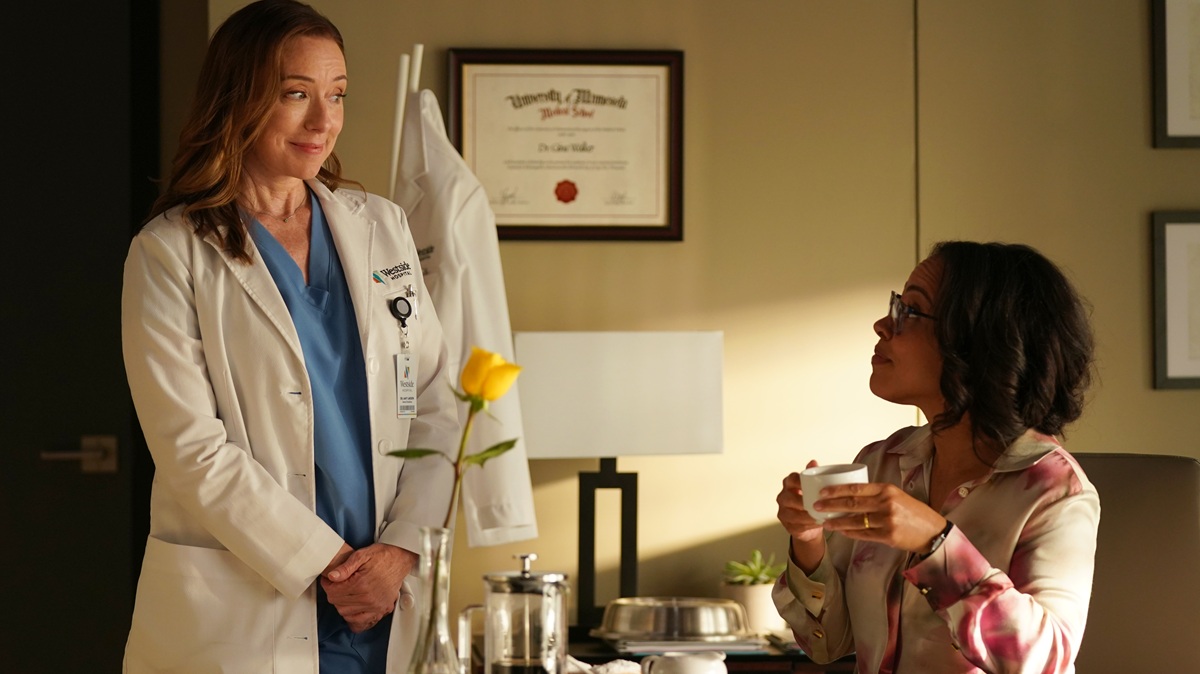TL;DR: Doc Season 2, Episode 4 delivers a haunting mix of hospital tension, emotional confession, and memory-driven mystery. Molly Parker’s performance remains breathtaking, the writing sharp as a scalpel. Love is dangerous, guilt is contagious, and nobody at Westside General is walking out unscarred.
Doc
If you’ve been watching Doc long enough to think you understand its rhythm, Episode 4 (“Something to Prove”) is here to remind you that emotional equilibrium has no place at Westside General. Every week, this Fox medical drama dares to be both ruthless and intimate — equal parts trauma case and therapy session — and this episode might be the best distillation of what makes it so addictively painful.
I’ve said it before: Doc doesn’t just dissect medicine. It dissects people. Their memories, their guilt, their self-preservation mechanisms disguised as compassion. And nowhere is that clearer than in “Something to Prove,” an episode that hums like a quiet panic attack, slowly building from workplace tension into emotional collapse.
The Chief Who Bleeds in Silence
Let’s start with Joan Ridley — Felicity Huffman’s sharp, brittle new chief who’s rapidly becoming the show’s most fascinating moral study. Joan is a perfectionist trapped in a decaying body, hiding a leukemia diagnosis behind her clipboard and cruel efficiency. Her scenes are exhausting in the best way: you can feel the weight of someone holding herself together through sheer administrative rage.
She sets the tone for the episode early on, declaring that no one’s job is safe and that Westside’s staff must meet impossible standards. It’s a chilling move, but also an oddly empathetic one. Because deep down, Joan isn’t a villain — she’s just scared. Scared that control is the only way to survive, scared that softness equals death. And in the sterile world of hospital hierarchy, she’s right.
Amy and Jake: Love as a Liability
Meanwhile, Amy (Molly Parker) and Jake (Jon Ecker) are trapped in the aftermath of last week’s code disaster — and in the gravitational pull of their unresolved relationship. Their chemistry remains electric, but Doc is too self-aware to romanticize it. What they share isn’t just attraction; it’s shared trauma, memory, and professional guilt compressed into one ongoing migraine of longing.
Their conversation about Joan’s “no-romance” warning hits hard because it isn’t just about policy — it’s about self-preservation. They both know that if they fall again, they’ll crash harder than before. Still, when Jake looks at Amy with that quiet ache, you know that this pause is temporary. In Doc, emotional distance is a fantasy. The heart always codes blue.
The Ghost of Christmas Past: Enter Hannah Clark
Episode 4 introduces a new intern, Hannah Clark (Emma Pfitzer Price), and from the moment she walks on screen — bright-eyed, over-prepared, smiling too hard — something feels off. Her father, Dr. Brian Clark, once worked at Westside back when Amy was chief, and his ghost lingers over every scene like a shadow only Amy can’t see.
Through fragmented flashbacks, we piece together what happened: Amy disciplined Dr. Clark for walking out mid-surgery, an act that ended his career and may have led to his death. The episode doesn’t spoon-feed it, but the emotional math is clear. Hannah’s internship isn’t coincidence — it’s retribution dressed as curiosity.
And those flashbacks — all Christmas lights and guilt — are the show’s cruelest weapon. They bleed into Amy’s present like seizures, turning memory into a physical wound. Doc has always been about the body as metaphor, but here, memory itself becomes a disease. The more Amy remembers, the more it hurts.
Michael’s Emotional Mirror
While Amy is being haunted by ghosts of her own making, Michael (Omar Metwally) gets pulled into a heartbreaking case involving a patient whose medical proxy is still listed as his ex-husband. It’s one of those classic Doc subplots — morally ambiguous, painfully human, and completely gutting.
As Michael navigates the bureaucracy of love and legality, he realizes that his own life mirrors the case: he, too, never changed his proxy from Amy. That revelation lands like a quiet confession — proof that no matter how much he tries to move on, she’s still his emergency contact, emotionally and literally.
His confrontation with Jake later in the episode is beautifully restrained. No yelling, no theatrics — just two men standing in the wreckage of their own restraint. Both say they’ve moved on, and both lie through their teeth. Doc knows that sometimes the cruelest heartbreak is the one you don’t perform.
Guilt as a Full-Time Job
One of the things I love (and occasionally resent) about Doc is how it refuses to let its women exist without consequence. Gina (Amirah Vann), still burdened by the trauma of the Season 1 train accident, spends the episode trying to buy forgiveness through anonymous donations. Amy, in a rare moment of empathy, reaches out — not with pity, but with action. She contacts Gina’s wife, breaking a boundary but saving her from isolation.
It’s a moment that captures what Doc does best: messy compassion. Nobody here makes the “right” choice; they just make the most human one. And for a show about control, it’s those moments of chaos that feel most honest.
The Slow Burn of Self-Destruction
By the final act, Amy’s subconscious is practically screaming at her. The flashbacks accelerate; the physical pain worsens. Her brain, the very thing she’s built her life around, is turning against her. And in a show this precise, that isn’t just coincidence — it’s destiny.
The last scene of the episode, with Amy unknowingly replaying the memory of Dr. Clark at a Christmas market, is haunting. She doesn’t yet know the truth, but the audience does. That gap between knowledge and understanding — between what’s remembered and what’s repressed — is where Doc lives.
The Bigger Picture
If Season 1 was about survival, Season 2 is about confrontation. “Something to Prove” isn’t just a clever episode title — it’s the thesis of the show right now. Every character is trying to prove something: Joan’s proving she’s still strong enough to lead; Amy’s proving she’s still good enough to forgive herself; Hannah’s proving she’s not her father’s daughter — or maybe proving that she is.
And in between all that, Doc quietly becomes one of the most psychologically ambitious network dramas in years. It’s not just about medicine — it’s about the moral fractures inside the people who practice it.
Performances and Direction
Molly Parker is, unsurprisingly, extraordinary. There’s something volcanic about her stillness — the way she communicates panic through restraint, memory through posture. Jon Ecker matches her beat for beat, his performance quietly aching with self-loathing and affection. Felicity Huffman, meanwhile, continues her second-act career renaissance with a performance so tightly wound it feels like it could shatter glass.
Director Adam Kane keeps the episode visually claustrophobic — all cold blues and glass reflections — turning Westside into a pressure cooker of secrets. Every corridor feels like a confession booth, every flashback like a fever dream.
Final Thoughts
“Something to Prove” might be Doc’s best episode of the season so far — a tightly wound, emotionally devastating hour that uses hospital drama tropes to explore guilt, memory, and the unbearable weight of being human. It’s not an easy watch, but then again, nothing worth diagnosing ever is.
Fox’s Doc has officially evolved from a procedural into something richer: a meditation on the price of compassion in a system that punishes it. And if Amy’s brain really is trying to warn her, I think ours might be too.







